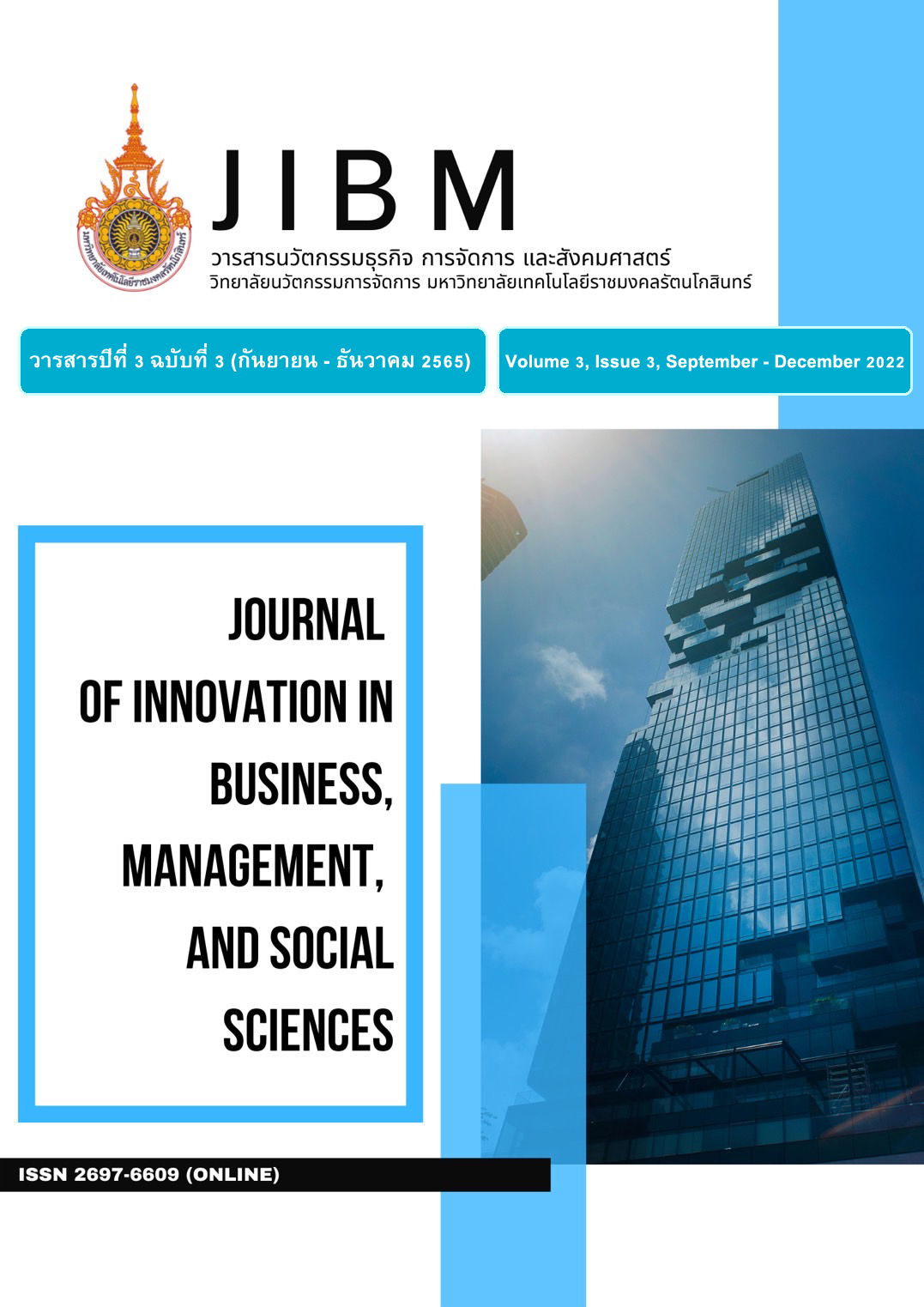Impact of China and US Exposure and ESG Channels: When Thailand Stock Market Meets COVID-19
คำสำคัญ:
COVID-19, Event study, Thai stock market, ESG, International exposureบทคัดย่อ
This study investigates the factors that affected the Thai stock market during the COVID-19 outbreak. It explores the effects of ESG and China and US exposure to the returns of the Thailand’s stock market. This study employes the data of listed companies in the ESG100 by Thaipat as the sample. For China and US exposure, the sample includes data gathered by companies with offices, branches, and subsidiaries in China and the US. Through an event study, The data includes abnormal returns from May to December 2020. The study examines how cumulative abnormal returns related to ESG and China and US exposure using cross-sectional analysis. The result reveals that there is no relationship between ESG and cumulative abnormal returns during the COVID-19 pandemic period. The empirical result shows that a firm with China exposure in the first wave has positive abnormal returns when the COVID-19 situation is getting better in China. However, there is no relationship between US exposure and cumulative abnormal returns during the COVID-19 pandemic period.
เอกสารอ้างอิง
Al-Awadhi, Abdullah M., Alsaifi, K., Ahmad Al-Awadhi, and Alhammadi, S. (2020). Death and contagious infectious diseases: Impact of the COVID-19 virus on stock market returns. Journal of Behavioral and Experimental Finance, 27, 100326.
Albuquerque, Rui, Yrjo, Koskinen, Yang, Shuai, and Zhang, Chendi. (2020). Resiliency of Environmental and Social Stocks: An Analysis of the Exogenous COVID-19 Market Crash. The Review of Corporate Finance Studies, 3, 593–621.
Amihud, Y. (2002). Illiquidity and stock returns: cross-section and time-series effects. Journal of Financial Markets, 5, 31-56.
Baig, Ahmed S., Butt, H. A., Haroon, O., and Syed Aun R. Rizvi, (2021). Deaths, panic, lockdowns, and US equity markets: The case of COVID-19 pandemic. Finance Research Letters, 38, 101701.
Broadstock, David C., Chan, Kalok., Louis T.W. C, and Wang, X. (2021). The role of ESG performance during times of financial crisis: Evidence from COVID-19. Finance Research Letters, 38, 101716.
Busch, Timo, and Gunnar Friede. (2018). The Robustness of the Corporate Social and Financial Performance Relation: A Second-Order Meta-Analysis. Corporate Social Responsibility and Environmental Management, 25, 583-608.
Carroll, Archie B. (1999). Corporate social responsibility: Evolution of a Definitional Construct. Business & Society, 38, 268-295.
Chen, Ester, and Ilanit Gavious. (2015). Does CSR have different value implications for different shareholders?. Finance Research Letters, 14, 29-35.
Cornett, Marcia M., Otgontsetseg Erhemjamts, and Hassan Tehranian. (2016). Greed or good deeds: An examination of the relation between corporate socials responsibility and the financial performance of U.S. commercial banks around the financial crisis. Journal of Banking & Finance, 70, 137-159.
Guiso, Luigi, Paola Sapienza, and Luigi Zingales. (2008). Trusting the Stock Market. Journal of finance, 63, 2557-2600.
Haroon, Omair, Syed Aun R. Rizvi. (2020). COVID-19: Media coverage and financial markets behavior—A sectoral inquiry. Journal of Behavioral and Experimental Finance, 27, 100343.
Hoepner, Andreas G. F., Ioannis Oikonomou, Zacharias Sautner, Laura T. Starks, and Xiaoyan Zhou. (2021). ESG Shareholder Engagement and Downside Risk, Working Paper. European Corporate Governance Institute
Huang, Shoujun, and Hezhe Liu. (2021). Impact of COVID-19 on stock price crash risk: Evidence from Chinese energy firms. Energy Economics, 101, 105431.
Kempf, Alexander , and Peer Osthoff. (2007). The Effect of Socially Responsible Investing on Portfolio Performance. European Financial Management, 13, 908-922.
Lins, Karl V., Henri Servaes, and Ane Tamayo. (2017). Social Capital, Trust, and Firm Performance: The Value of Corporate Social Responsibility during the Financial Crisis. Journal of finance, 72, 1785 – 1824.
Liu, HaiYue, Aqsa Manzoor, CangYu Wang, Lei Zhang, and Zaira Manzoor. (2020). The COVID-19 Outbreak and Affected Countries Stock Markets Response. International Journal of Environmental Research and Public Health, 17, 2800.
Liu, HaiYue, Yile Wang, Dongmei He, and Cangyu Wang. (2020). Short term response of Chinese stock markets to the outbreak of COVID-19. Applied Economics, 52, 5859-5872.
McWilliams, Abagail, and Donald Siegel, 2001, Corporate Social Responsibility: A Theory of the Firm Perspective , The Academy of Management Review, 26,117-127
Ozili, Peterson K., and Thankom Arun. (2020). Spillover of COVID-19: Impact on the Global Economy, Working Paper. Retrieve frome: https://ssrn.com/abstract=3562570 or http://dx.doi.org/10.2139/ssrn.3562570.
Takahashi, Hidenori, and Kazuo Yamada. (2021). When the Japanese stock market meets COVID-19: Impact of ownership, China, and US exposure, and ESG channels. International Review of Financial Analysis, 74, 101670.
Yong, Hue H. A., and Elaine Laing. (2021). Stock market reaction to COVID-19: Evidence from U.S. Firms’ International exposure. International Review of Financial Analysis, 76, 101656.
Zhao, Xin, Xianling Jiang, and Zhaoyang Li. (2015). The impact of the economic crisis on the financial performance of multinational corporations, International Review of Economics & Finance, 37, 55-68.



